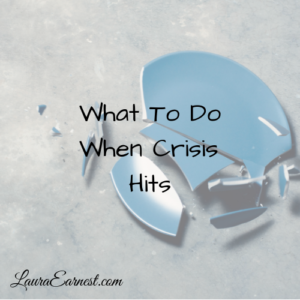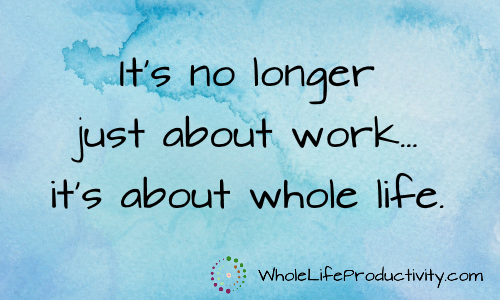
What To Do When Crisis Hits
Crisis can happen in the blink of an eye. One minute life is normal, and then everything is different. It could be anything that rocks your stability: death, divorce, accident, layoff, shutdown. But crisis comes to us all, and it’s important to know what to do.
This particular article has been a long time making. Eleven years ago my husband was hanging a valance in our front entry when he overbalanced and fell twenty feet, landing on his back at my feet. My daughter, who was five at the time, had a friend over, and they were playing quietly upstairs. I ran for the phone. The less than three minutes that it took the ambulance to get there were the longest in my life. In that time, I was talking to the 911 dispatcher, fighting hysteria, telling the girls to go next door, and keeping my husband, unconscious and unable to see, from moving. When the professionals got there, they took care of my husband. Our city has an all-volunteer ambulance service, and they are dispatched with the firefighters. The ambulance crew took care of my husband, while one of the firefighters sat me down on the porch with my head between my legs until the black spots receded. The other firefighter cleaned the blood and vomit from my floor.
My neighbors got me through the next hours. The next door neighbor, alerted by the kids turning up on their front step, turned the girls over to his daughter, who walked them down to the friend’s house. He came over and asked questions, like where the ambulance was taking my husband. He drove me to the hospital and stayed with me for an hour in the emergency waiting room. Before we left, another neighbor came over and helped me collect purse and phone, and agreed to track down the dog and cats, since I didn’t know if they had gotten out. His wife came and sat with me in the emergency room later, bringing snacks and giving me a ride home after my husband was admitted to Neuro ICU with a severe concussion, cracked skull and four broken ribs. During the time waiting, I called my husband’s friend, who he was supposed to fish with the next day. This friend, who is a doctor, came to the hospital, looked over the information in the charts, and explained it to me until I could comprehend.
My husband made a full recovery. I am very grateful for that. But even now, writing about it after so long, I still feel the fear and anxiety that gripped me for weeks.
So here are some lessons to be learned about being in a crisis:
During A Crisis
During the midst of the crisis, you won’t be able to think clearly. Even when the immediate crisis is over, you will still need support and help.
Pare It Down
We do a lot of things every day that are not necessary to support life. We plan, watch television, read, work, dust, shop and many other things. But none of these are truly necessary. What is necessary is getting food and water into your body and resting.
So pare it down. Everything can wait except the bare essentials. Feed the people and animals you are responsible for, including yourself. Bathe yourself and your children. Sleep, if you can. But let go of everything else.
Some people would tell you that routines are necessary in a crisis. I disagree. From experience I know that doing the absolute bare minimum will carry you a long way. And for children? Routine are good, but in a crisis, they need extra reassurance and comfort. And if that means later bedtime or sleeping with you, so be it.
Let Others Help
This was a hard lesson for me. In the days that followed the accident, I was deluged by calls from our church family and neighbors. I started to say we didn’t need anything, but on the fourth call in, a tell-it-as-it-is church member told me as it was: “By refusing to let us help, you’re not letting us feel any better. We feel helpless, and we need to act.” At that point, I decided that whatever need I had I would ask the next person who called or stopped by, and if they said no, that was OK.
The church secretary called and said that the minister was insisting on getting my cell phone number and stopping over at the house. I couldn’t stand the minister, who was an interim and overbearing. I asked the secretary to keep the minister away from me, which she gladly did.
My friend called on the Saturday morning a week after the accident. I asked her to come over and sit with my husband, who was determined to not stay in bed. I needed to get out and run errands, so she came and sat with her knitting, while he sat at his desk. Another friend from church fetched my father-in-law from the airport (because when my husband was released from the hospital after three days, I gave my husband the choice: his father or my mother to help.) A neighbor got my daughter on the school bus and and her former caregiver picked her up from after-school care.
People want to help. Ask for what you need, and let them do it.
Before A Crisis
There are some things that should be done in the event of a crisis happening. Because when the time comes, you will need them.
Know Your Neighbors
I come from the Midwest, growing up in the neighborhood where people sat on the porch after dinner in summer, or went to someone else’s porch for a chat. We knew our neighbors by name and sight, two blocks in every direction. Of course that was many years ago, but that has stayed with me.
When we moved into our house, I went to meet the neighbors. Those that had children were easier, because I often saw them at the community park near my home. For those that didn’t have small children, though, I made an effort to know them. I have elementary school teachers for two houses on either side of me. There are two nurses across the street. So I knew that my daughter, if she needed help of any kind, could go to any of the houses immediately surrounding us and be safe.
Knowing my neighbors has been wonderful outside of the crisis. They are genuinely caring people, and even though we have fundamental differences across the board, I am glad that I live among them. And during the crisis, they all pitched in and got me through those first few hours.
Have Everything In Your Phone
My neighbor saved me a lot of difficulties when he found my purse and handed it to me on my way out the door to the hospital. He also handed my my husband’s phone, which had been sitting next to it, thinking it was mine.
I was grateful for this coincidence, because when I got to the hospital, I realized without the purse I wouldn’t have the insurance information. I was doubly grateful when I realized that I needed to make phone calls, and I didn’t have the numbers in my phone for his parents or the friend he was supposed to fish with. During the time alone in the waiting room, I wanted desperately to talk to two women who were part of my women’s group and who stood in place of grandmothers, but I didn’t have their numbers in my phone.
Put everything you need in your phone. Take photos of your insurance card and ID. Put phone numbers in for everyone you can think of that you might want to talk to at some point.
You never know when you might need them.
When You’re Outside
Of course, we know of those who are going through a crisis. And it’s important to be able to help, both for you and them.
Be Specific In Offers of Help
If you call and get the “we don’t need anything” when you know they must, be specific. Offer to go to the store or run errands. Offer to sit so the caregiver has some respite. Ask if they need milk or bread and then bring some. Or fruit or vegetables.
Of course, if they persist, you could do what the blunt lady from my church did and call them on it. Or you can take a ride by the house – you may see the grass needs to be cut or the driveway shoveled. Do what needs to be done. If you stop over for a visit and see the garbage needs to be taken out or the dishes done, do it.
A Note on Food
During a crisis, everyone likes to make food. Don’t get me wrong – this is great, especially with websites that help you schedule the food delivery. I finally had to call a halt to the casserole patrol when they filled up both of my freezers and my fridge. And it was all delicious and very welcome – I didn’t cook for almost a month.
But if you bring food, make sure that it can be frozen. Include directions on how it should be cooked. And please use disposable cookware. Don’t add to the burden on the person by making them keep track of whose dishes are whose.
If you don’t cook? Bring disposables – paper plates, plastic cups, plastic silverware, toilet paper, paper towels, facial tissues. Or bring fresh fruit and veggies that will last a couple of days. Bakery treats are great too. The point is, bring things that don’t have to be used right away. Some days people just don’t feel like eating – or they are working their way through leftovers.
Conclusion
I’ve looked at dealing with a crisis from three different vantage points – before, during, and from the outside. I hope that this has given you some perspective and ideas.
Action Step
If you don’t already have everything in your phone, take photos of your id and medical cards right now. Then make sure you have all the phone numbers necessary. You won’t regret being prepared – even if you never have to use them.




